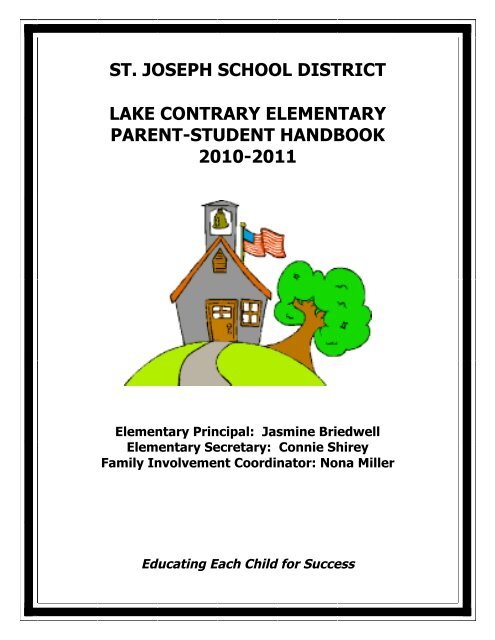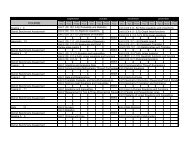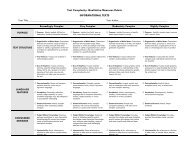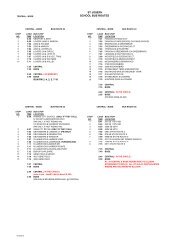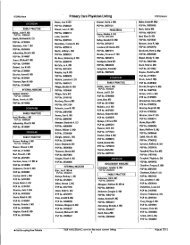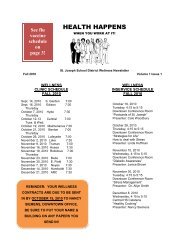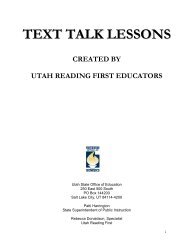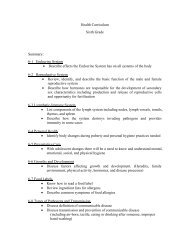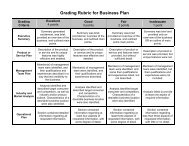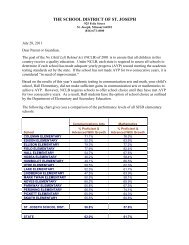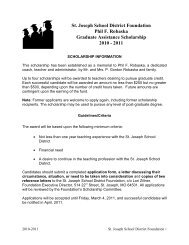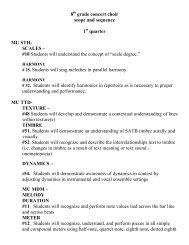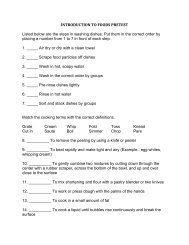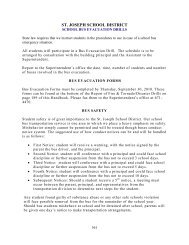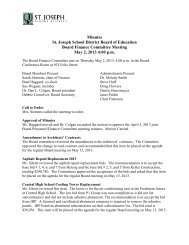st. joseph school district lake contrary ... - SJSD Home Page
st. joseph school district lake contrary ... - SJSD Home Page
st. joseph school district lake contrary ... - SJSD Home Page
Create successful ePaper yourself
Turn your PDF publications into a flip-book with our unique Google optimized e-Paper software.
ST. JOSEPH SCHOOL DISTRICTLAKE CONTRARY ELEMENTARYPARENT-STUDENT HANDBOOK2010-2011Elementary Principal: Jasmine BriedwellElementary Secretary: Connie ShireyFamily Involvement Coordinator: Nona MillerEducating Each Child for Success
2009-2010 Staff DirectoryAdmini<strong>st</strong>rationJasmine BriedwellSecretarialConnie ShireyClassroom TeachersRebecca GilliesJennifer DukeJulie HalloranSarah RyderStephanie TimmonsBonnie HidyAllison <strong>Page</strong>Emily AuxierKatie KingDiana DeatherageBeth GregoryCharlene AllsburyAmanda SaxtonTammy <strong>Page</strong>Eileen PittsHealthJennifer WineingerLinda SwopeTitle ICarole HoneycuttSusan StilesErin RochaTeresa KinneyJackie SmithJolee SinseyAnnie SchlevanNona MillerSpecial ServicesAngie CourtneyShannon FullerKayla CollinsESOLMelissa MollusFine ArtsMi<strong>st</strong>y KikolerJudy LongJoyce Schu<strong>st</strong>erRaya ShaferPhysical EducationLacey HooverLibrary MediaMimi WippleMaintenanceJo PetersTerri MeersNutrition ServicesPhyllis CurtisKelly ChaneyDorothy FordLinda HicksPrincipalSecretaryPre<strong>school</strong>KindergartenKindergartenFir<strong>st</strong> GradeFir<strong>st</strong> GradeSecond GradeSecond GradeThird GradeThird GradeFourth GradeFourth GradeFifth GradeFifth GradeSixth GradeSixth GradeRegi<strong>st</strong>ered NurseElementary CounselorIn<strong>st</strong>ructional CoachTitle I Reading—K/1Title I Reading—K/Interventioni<strong>st</strong>Title I Intervention Teacher (RTI)Title I K-6 ParaprofessionalTitle I/ Pre<strong>school</strong> ParaprofessionalTitle I/ Pre<strong>school</strong> ParaprofessionalFamily Involvement CoordinatorK-6 Special EducationSpecial Services ParaprofessionalSpeech and Language Pathologi<strong>st</strong>ESOL TeacherMusic EducationBandArt EducationArt EducationPhysical EducationLibrarianEngineerCu<strong>st</strong>odianNutrition Services ManagerNutrition Services—CookNutrition Services—CookNutrition Services—Cook3
Arrival and Dismissal ProceduresSchool Starts – 8:44School Dismisses – 3:27Breakfa<strong>st</strong> will be available to <strong>st</strong>udents upon arrival to <strong>school</strong>. Breakfa<strong>st</strong> is served from8:20- 8:44. Breakfa<strong>st</strong> follows the same guidelines as free/reduced lunches follow.When picking up your child at the end of the day, we ask all parents to wait outside in thecar or the covered area outside of the main entrance and not at the classroom door. Thispolicy is in place to ensure a safe environment exi<strong>st</strong>s in the <strong>school</strong> at one of the busie<strong>st</strong>times of day.We encourage you to try and schedule your child’s doctor and dental appointmentsaround <strong>school</strong> hours. If this is not possible, please send a note <strong>st</strong>ating the time and withwhom the child is to go. You mu<strong>st</strong> come to the office to check your child out early forany reason. Teachers and <strong>st</strong>aff are in<strong>st</strong>ructed not to dismiss <strong>st</strong>udents from the room atany time without approval from the office. Any time a child is being picked up early,the office mu<strong>st</strong> receive a phone call <strong>st</strong>ating whom and when the arranged pick upwill be. Even if a parent sends someone on li<strong>st</strong>ed as an emergency contact the <strong>school</strong>cannot dismiss without proper parent/guardian notice.The office shall not excuse a <strong>st</strong>udent before the end of the <strong>school</strong> day without a reque<strong>st</strong>by the <strong>st</strong>udent’s parent or guardian. Telephone reque<strong>st</strong>s for early dismissal of a <strong>st</strong>udentshall be honored only if the caller can be positively identified as the <strong>st</strong>udent’s parent orguardian.Students will not be allowed to use the phone to seek permission to go home in a waydifferent from the way they normally go home from <strong>school</strong>. If there is to be a change inthe transportation of your child, the parent or guardian mu<strong>st</strong> provide a note in advance ofthis change.TelephoneThe office phone is a business phone and is not to be used by <strong>st</strong>udents. You are welcometo call the <strong>school</strong> during office hours and leave a message for your child. Students willnot be called to the phone during <strong>school</strong> hours.Cellular Phones and Other Electronic DevicesStudents are not allowed to have cellular phones with them while at <strong>school</strong> as they areoften misused and open to possible theft. These items will be confiscated if utilizedduring the <strong>school</strong> day, and returned only to the parent. Toys and other electronicitems should not come to <strong>school</strong>.4
Dress Code:THE SCHOOL DISTRICT OF ST. JOSEPH925 Felix StreetSt. Joseph, Missouri 64501Elementary SchoolAugu<strong>st</strong>, 2009Dear Parent,Staff members in the St. Joseph Public Schools are con<strong>st</strong>antly <strong>st</strong>riving to provide the be<strong>st</strong>conditions possible for <strong>st</strong>udent learning and achievement. Any condition, that may di<strong>st</strong>ract<strong>st</strong>udents from learning, is of serious concern.This letter is designed to inform parents and <strong>st</strong>udents of clothing guidelines for the 2008-2009<strong>school</strong> year. These <strong>st</strong>andards will be admini<strong>st</strong>ered consi<strong>st</strong>ently in all <strong>school</strong>s.Student dress can have significant effect on learning and behavior. Clothing mu<strong>st</strong> cover the bodysufficiently and avoid attracting excessive attention or causing disruptions. The following havebeen found to be a di<strong>st</strong>raction to the learning process and therefore are unacceptable for wearingin the elementary <strong>school</strong>:1. Clothing that doesn’t sufficiently cover the body including: tube tops swimsuit, backless, halter or<strong>st</strong>rapless tops, bare midriff, mid-cut or see-through shirts, or basketball jerseys that are cut low onthe sides.2. Shorts that are inappropriately short3. Overly long baggy jeans or pajamas4. Clothing that advertises sub<strong>st</strong>ances such as alcohol, cigarettes, drugs and violence5. Clothing that utilizes double play on words, obscenities, profanity or is sugge<strong>st</strong>ive in any way6. Large chains7. Caps, hats or head coverings unless approved by the principal*Footwear mu<strong>st</strong> be worn at all times. Sandals are acceptable if they are safe and adequately secured to thefeet.The principal will make decisions regarding the appropriateness of clothing. In the eventthat a que<strong>st</strong>ion arises regarding clothing, parents will be contacted.We are asking your cooperation and support in our efforts to maintain the kind of <strong>school</strong>environment in which teachers are able to teach and <strong>st</strong>udents are able to learn. If you have anyque<strong>st</strong>ions, please feel free to call me at your convenience.Sincerely,Jasmine BriedwellElementary PrincipalAPPROVED BY THE ST. JOSEPH BOARD OF EDUCATION6
<strong>SJSD</strong> Elementary HandbookNote: A complete copy of all board policies referred to in this handbook can be found on the di<strong>st</strong>rict’swebsite: http://web.sjsd.k12.mo.us.Attendance PolicyThe <strong>school</strong> di<strong>st</strong>rict will work in conjunction with the Buchanan County Prosecuting Attorney’s Office andthe Buchanan County Juvenile Office to assure compliance with the Missouri attendance law. Parents of<strong>st</strong>udents who are unexcused will be notified when their child reaches five (5) days of unexcused absences.If absences per seme<strong>st</strong>er exceed fifteen (15) days for elementary <strong>st</strong>udents and seven (7) days for middle andhigh <strong>school</strong> <strong>st</strong>udents, the case may be referred to the Prosecuting Attorney’s Office for consideration ofcriminal prosecution as a class C misdemeanor.The Prosecuting Attorney uses the following guidelines when considering some days as unexcusedabsences.1. Assignments are to be picked up at the <strong>school</strong>. Failure to do so after three (3) will result inthe absences recorded as unexcused.2. Notification of absences is extremely important. Parents should contact <strong>school</strong> whenever achild is absent or going to be absent.3. If a child is absent for more than two (2) consecutive days, it is presumed that medicaltreatment will be sought. If no doctor’s excuse is provided after five (5) consecutive days, theabsence will be considered unexcused.If there are extenuating circum<strong>st</strong>ances causing the excessive absences, parents should contact the buildingprincipal. When a <strong>st</strong>udent returns to <strong>school</strong> from any absence, a written excuse is required.Bus SafetyStudent safety is of great importance to the St. Joseph School Di<strong>st</strong>rict. Our <strong>school</strong> bus transportationservice is one area in which we place a heavy emphasis on safety. Misbehavior simply cannot be permittedand will be treated through a bus conduct notice sy<strong>st</strong>em. The sugge<strong>st</strong>ed use of how conduct notices can behandled is as follows:• Fir<strong>st</strong> Notice: <strong>st</strong>udent will receive a warning, with the notice signed by the parent the busdriver, and the principal.• Second Notice: <strong>st</strong>udent will conference with a principal and could face <strong>school</strong> disciplineor further suspension from the bus not to exceed 3 <strong>school</strong> days.• Third Notice: <strong>st</strong>udent will conference with a principal and could face <strong>school</strong> discipline orfurther suspension from the bus not to exceed 5 days.• Fourth Notice: <strong>st</strong>udent will conference with a principal and could face <strong>school</strong> disciplineor further suspension from the bus not to exceed 10 days.• Subsequent Notices: Should a <strong>st</strong>udent receive a 5 th notice, a meeting mu<strong>st</strong> occur betweenthe parent, principal, and representatives from the transportation division to determinenext <strong>st</strong>eps for the <strong>st</strong>udent.Any <strong>st</strong>udent found guilty of sub<strong>st</strong>ance abuse or any other safe <strong>school</strong>s violation will face possible removalfrom the bus for the remainder of the <strong>school</strong> year. Should bus <strong>st</strong>udents misbehave at <strong>school</strong> and bedetained after <strong>school</strong>, parents will be given one day’s notice to make transportation arrangements.The <strong>school</strong> principal has full authority to apply the consequences for bus misconduct and consider<strong>st</strong>he reque<strong>st</strong>s of <strong>school</strong> bus drivers. The principal is not obligated, however, to issue certain consequenceson demand of the bus driver, but in<strong>st</strong>ead has full authority to determine the course of action in the be<strong>st</strong>intere<strong>st</strong>s of <strong>st</strong>udents and <strong>school</strong> bus safety.Check PolicyPersonal checks are welcome at the St. Joseph School Di<strong>st</strong>rict. The School Di<strong>st</strong>rict retains a collectionservice to recover all bad checks. When paying by check it is important that the check writer is aware that7
they are authorizing any dishonored checks to be collected electronically from their account along with aminimum service fee of $25.00. The check writer is also responsible for all other collection co<strong>st</strong>s.Student DisciplineThe Student Code of Conduct is designed to fo<strong>st</strong>er <strong>st</strong>udent responsibility, respect for others, and to providefor the orderly operation of di<strong>st</strong>rict <strong>school</strong>s. No code can be expected to li<strong>st</strong> each and every offense thatmay result in disciplinary action; however, it is the purpose of this code to li<strong>st</strong> certain offenses which, ifcommitted by a <strong>st</strong>udent, will result in the imposition of a certain disciplinary action. Any conduct notincluded herein, or any aggravated circum<strong>st</strong>ance of any offense or any action involving a combination ofoffenses may result in disciplinary consequences that extend beyond this code of conduct as determined bythe principal, superintendent and/or Board of Education. In extraordinary circum<strong>st</strong>ances where theminimum consequence is judged by the superintendent or designee to be manife<strong>st</strong>ly unfair or not in theintere<strong>st</strong> of the di<strong>st</strong>rict, the superintendent or designee may reduce the consequences li<strong>st</strong>ed in this policy, asallowed by law. This code includes, but is not necessarily limited to, acts of <strong>st</strong>udents on <strong>school</strong> property,including playgrounds, parking lots and <strong>school</strong> transportation, or at a <strong>school</strong> activity, whether on or off<strong>school</strong> property.Reporting to Law EnforcementIt is the policy of the St. Joseph School Di<strong>st</strong>rict to report all crimes occurring on <strong>school</strong> grounds to lawenforcement, including, but not limited to, the crimes the di<strong>st</strong>rict is required to report in accordance withlaw.The principal shall also notify the appropriate law enforcement agency and superintendent if a <strong>st</strong>udent is inviolation of the di<strong>st</strong>rict's policy.In addition, the superintendent shall notify the appropriate division of the juvenile or family court uponsuspension for more than ten (10) days or expulsion of any <strong>st</strong>udent who the di<strong>st</strong>rict is aware is under thejurisdiction of the court.Documentation in Student's Discipline RecordThe principal, designee or other admini<strong>st</strong>rators or <strong>school</strong> <strong>st</strong>aff will maintain all discipline records asdeemed necessary for the orderly operation of the <strong>school</strong>s and in accordance with law and policy JGF.Participation in ActivitiesStudents who are suspended or expelled for any reason are prohibited from attending or taking part in anydi<strong>st</strong>rict-sponsored activity, regardless of location, or any activity that occurs on di<strong>st</strong>rict property. Studentswho violate this provision will be required to leave the activity and may face further discipline, includingan additional period of suspension or expulsion.Prohibition again<strong>st</strong> Being on or near School Property during SuspensionAll <strong>st</strong>udents who are suspended or expelled are prohibited from being on <strong>school</strong> property for any reasonunless permission is granted by the superintendent or designee.Any <strong>st</strong>udent who is suspended for any offenses li<strong>st</strong>ed in § 160.261, RSMo., or any act of violence or drugrelatedactivity defined by policy JGF as a serious violation of <strong>school</strong> discipline shall not be allowed to bewithin 1,000 feet of any public <strong>school</strong> in the di<strong>st</strong>rict unless one (1) of the following conditions exi<strong>st</strong>:1. The <strong>st</strong>udent is under the direct supervision of the <strong>st</strong>udent's parent, legal guardian or cu<strong>st</strong>odian.2. The <strong>st</strong>udent is under the direct supervision of another adult designated by the <strong>st</strong>udent's parent, legalguardian or cu<strong>st</strong>odian. The designation mu<strong>st</strong> be made in advance and in writing to the principal of8
the <strong>school</strong> that suspended the <strong>st</strong>udent.3. The <strong>st</strong>udent is in an alternative <strong>school</strong> that is located within 1,000 feet of a public <strong>school</strong> in thedi<strong>st</strong>rict.4. The <strong>st</strong>udent resides within 1,000 feet of a public <strong>school</strong> in the di<strong>st</strong>rict and is on the property of his orher residence.If a <strong>st</strong>udent violates this prohibition he or she may be suspended or expelled in accordance with the offense,"Failure to Meet Conditions of Suspension," li<strong>st</strong>ed below.Prohibited ConductThe following are descriptions of prohibited conduct as well as potential consequences for violation. Inaddition to the consequences specified here, <strong>school</strong> officials will notify law enforcement and documentviolations in the <strong>st</strong>udent's discipline file pursuant to law and Board policy.1. Academic Dishone<strong>st</strong>y--Cheating on te<strong>st</strong>s, assignments, projects or similar activities; plagiarism;claiming credit for another person’s work; fabrication of facts, sources or other supporting material;unauthorized collaboration; facilitating academic dishone<strong>st</strong>y; and other misconduct related toacademics.Fir<strong>st</strong> Offense: No credit for the work, grade reduction, or replacement assignment.Subsequent Offense: No credit for the work, grade reduction, course failure, or removalfrom extracurricular activities.2. Arson--Starting or attempting to <strong>st</strong>art a fire or causing or attempting to cause an explosion.Fir<strong>st</strong> Offense: Detention, in-<strong>school</strong> suspension, 1-180 days out-of-<strong>school</strong> suspension, orexpulsion. Re<strong>st</strong>itution if appropriate.Subsequent Offense: 1-180 days out-of-<strong>school</strong> suspension or expulsion. Re<strong>st</strong>itution ifappropriate.3. Assaulta. Hitting, <strong>st</strong>riking and/or attempting to cause injury to another person; placing a person inreasonable apprehension of imminent physical injury; physically injuring another person.Fir<strong>st</strong> Offense: Principal/Student conference, detention, in-<strong>school</strong> suspension, 1-180 days out-of-<strong>school</strong> suspension, or expulsion.Subsequent Offense: In-<strong>school</strong> suspension, 1-180 days out-of-<strong>school</strong>suspension, or expulsion.b. Attempting to kill or cause serious physical injury to another; killing or causing seriousphysical injury to another.Fir<strong>st</strong> Offense:Expulsion.4. Automobile/Vehicle Misuse--Discourteous or unsafe driving on or around <strong>school</strong> property,unregi<strong>st</strong>ered parking, failure to move vehicle at the reque<strong>st</strong> of <strong>school</strong> officials, failure to followdirections given by <strong>school</strong> officials or failure to follow e<strong>st</strong>ablished rules for parking or driving on<strong>school</strong> property.Fir<strong>st</strong> Offense: Suspension or revocation of parking privileges, detention, in-<strong>school</strong>suspension, or 1-10 days out-of-<strong>school</strong> suspension.Subsequent Offense: Revocation of parking privileges, detention, in-<strong>school</strong> suspension,or 1-180 days out-of-<strong>school</strong> suspension.9
5. Bullying (see Board policy JFCF)--Repeated and sy<strong>st</strong>ematic intimidation, harassment andattacks on a <strong>st</strong>udent or multiple <strong>st</strong>udents, perpetuated by individuals or groups. Bullying includes,but is not limited to: physical violence, verbal taunts, name-calling and put-downs, threats,extortion or theft, damaging property, and exclusion from a peer group.Fir<strong>st</strong> Offense: Detention, in-<strong>school</strong> suspension, or 1-180 days out-of-<strong>school</strong> suspension.Subsequent Offense: 1-180 days out-of-<strong>school</strong> suspension or expulsion.6. Bus or Transportation Misconduct (see Board policy JFCC)--Any offense committed by a<strong>st</strong>udent on transportation provided by or through the di<strong>st</strong>rict shall be punished in the same manneras if the offense had been committed at the <strong>st</strong>udent's assigned <strong>school</strong>. In addition, transportationprivileges may be suspended or revoked.7. Dishone<strong>st</strong>y--Any act of lying, whether verbal or written, including forgery.Fir<strong>st</strong> Offense: Nullification of forged document. Principal/Student conference,detention, in-<strong>school</strong> suspension or 1-10 days out-of-<strong>school</strong> suspension.Subsequent Offense: Nullification of forged document. Detention, in-<strong>school</strong>suspension, 1-180 days out-of-<strong>school</strong> suspension, or expulsion.8. Disrespectful or Disruptive Conduct or Speech (see Board policy AC if illegal harassment ordiscrimination is involved)--Verbal, written, pictorial or symbolic language or ge<strong>st</strong>ure that isdirected at any person that is in violation of di<strong>st</strong>rict policy or is otherwise rude, vulgar, defiant,considered inappropriate in educational settings or that materially and sub<strong>st</strong>antially disruptsclassroom work, <strong>school</strong> activities or <strong>school</strong> functions. Students will not be disciplined for speechin situations where it is protected by law.Fir<strong>st</strong> Offense: Principal/Student conference, detention, in-<strong>school</strong> suspension, or 1-10days out-of-<strong>school</strong> suspension.Subsequent Offense: Detention, in-<strong>school</strong> suspension, 1-180 days out-of-<strong>school</strong>suspension, or expulsion.9. Drugs/Alcohol (see Board policies JFCH and JHCD)a. Possession, sale, purchase or di<strong>st</strong>ribution of any over-the-counter drug, herbal preparationor imitation drug or herbal preparation.Fir<strong>st</strong> Offense: In-<strong>school</strong> suspension or 1-180 days out-of-<strong>school</strong> suspension.Subsequent Offense: 1-180 days out-of-<strong>school</strong> suspension or expulsion.b. Possession of or attendance while under the influence of or soon after consuming anyunauthorized prescription drug, alcohol, narcotic sub<strong>st</strong>ance, unauthorized inhalants,counterfeit drugs, imitation controlled sub<strong>st</strong>ances or drug-related paraphernalia, includingcontrolled sub<strong>st</strong>ances and illegal drugs defined as sub<strong>st</strong>ances identified under schedules I,II, III, IV or V in section 202 of the Controlled Sub<strong>st</strong>ances Act.Fir<strong>st</strong> Offense: In-<strong>school</strong> suspension, 1-180 days out-of-<strong>school</strong> suspension.Subsequent Offense: 1-180 days out-of-<strong>school</strong> suspension or expulsion.c. Sale, purchase or di<strong>st</strong>ribution of any prescription drug, alcohol, narcotic sub<strong>st</strong>ance,unauthorized inhalants, counterfeit drugs, imitation controlled sub<strong>st</strong>ances or drug-relatedparaphernalia, including controlled sub<strong>st</strong>ances and illegal drugs defined as sub<strong>st</strong>ancesidentified under schedules I, II, III, IV or V in section 202 of the Controlled Sub<strong>st</strong>ancesAct.10
Fir<strong>st</strong> Offense: 1-180 days out-of-<strong>school</strong> suspension or expulsion.Subsequent Offense: 1-180 days out-of-<strong>school</strong> suspension or expulsion.10. Extortion--Threatening or intimidating any person for the purpose of obtaining money oranything of value.Fir<strong>st</strong> Offense: Principal/Student conference, detention, in-<strong>school</strong> suspension, or 1-10days out-of-<strong>school</strong> suspension.Subsequent Offense: In-<strong>school</strong> suspension, 1-180 days out-of-<strong>school</strong> suspension, orexpulsion.11. Failure to Meet Conditions of Suspension--Coming within 1,000 feet of any public <strong>school</strong> inthe di<strong>st</strong>rict while on suspension for an offense that requires reporting to law enforcement or for anact of <strong>school</strong> violence or drug-related activity defined by di<strong>st</strong>rict policy as a serious violation ofthe di<strong>st</strong>rict's discipline policy. See section of this regulation entitled, "Prohibition again<strong>st</strong> Beingon or near School Property during Suspension."In determining whether to suspend or expel a <strong>st</strong>udent, consideration shall be given to whether the<strong>st</strong>udent poses a threat to the safety of any child or <strong>school</strong> employee and whether the <strong>st</strong>udent'spresence within 1,000 feet of the <strong>school</strong> is disruptive to the educational process or undermines theeffectiveness of the <strong>school</strong>'s discipline policy.Fir<strong>st</strong> Offense: Verbal warning, detention, in-<strong>school</strong> suspension, 1-180 days out-of<strong>school</strong>suspension, or expulsion.Subsequent Offense: Verbal warning, detention, in-<strong>school</strong> suspension, 1-180 days outof-<strong>school</strong>suspension, or expulsion.12. False Alarms (see also "Threats or Verbal Assault")--Tampering with emergency equipment,setting off false alarms, making false reports; communicating a threat or false report for thepurpose of frightening or di<strong>st</strong>urbing people, disrupting the educational environment or causing theevacuation or closure of <strong>school</strong> property.Fir<strong>st</strong> Offense: Re<strong>st</strong>itution. Principal/Student conference, detention, in-<strong>school</strong>suspension, 1-180 days out-of-<strong>school</strong> suspension, or expulsion.Subsequent Offense: Re<strong>st</strong>itution. In-<strong>school</strong> suspension, 1-180 days out-of-<strong>school</strong>suspension, or expulsion.13. Fighting (see also, "Assault")--Mutual combat in which both parties have contributed to theconflict either verbally or by physical action.Fir<strong>st</strong> Offense: Principal/Student conference, detention, in-<strong>school</strong> suspension, or 1-180days out-of-<strong>school</strong> suspension.Subsequent Offense: In-<strong>school</strong> suspension, 1-180 days out-of-<strong>school</strong> suspension, orexpulsion.14. Gambling--Betting on an uncertain outcome, regardless of <strong>st</strong>akes; engaging in any game ofchance or activity in which something of real or symbolic value may be won or lo<strong>st</strong>. Gamblingincludes, but is no limited to, betting on outcomes of activities, assignments, conte<strong>st</strong>s and games.Fir<strong>st</strong> Offense: Principal/Student conference, loss of privileges, detention, or in-<strong>school</strong>suspension.Subsequent Offense: Principal/Student conference, loss of privileges, detention, in<strong>school</strong>suspension, or 1-10 days out-of-<strong>school</strong> suspension.15. Hazing (see Board policy JFCF)--Any activity that a reasonable person believes wouldnegatively impact the mental or physical health or safety of a <strong>st</strong>udent or put the <strong>st</strong>udent in aridiculous, humiliating, <strong>st</strong>ressful or disconcerting position for the purposes of initiation, affiliation,11
admission, membership or maintenance of membership in any group, class, organization, club orathletic team including, but not limited to, a grade level, <strong>st</strong>udent organization or <strong>school</strong>-sponsoredactivity. Hazing may occur even when all <strong>st</strong>udents involved are willing participants.Fir<strong>st</strong> Offense: In-<strong>school</strong> suspension or 1-180 days out-of-<strong>school</strong> suspension.Subsequent Offense: 1-180 days out-of-<strong>school</strong> suspension or expulsion.16. Incendiary Devices – Possessing, displaying or using matches, lighters or other devices used to<strong>st</strong>art fires unless required as part of an educational exercise and supervised by di<strong>st</strong>rict <strong>st</strong>aff.Fir<strong>st</strong> Offense: Confiscation. Warning, principal/<strong>st</strong>udent conference, detention, or in<strong>school</strong>suspension.Subsequent Offense: Confiscation. Principal/Student conference, detention, in- <strong>school</strong>suspension, or 1-10 days out-of-<strong>school</strong> suspension.17. Public Display of Affection--Physical contact that is inappropriate for the <strong>school</strong> settingincluding, but not limited to, kissing and groping.Fir<strong>st</strong> Offense: Principal/Student conference, detention, in-<strong>school</strong> suspension, or 1-180days out-of-<strong>school</strong> suspension.Subsequent Offense: Detention, in-<strong>school</strong> suspension, 1-180 days out-of-<strong>school</strong>suspension, or expulsion.18. Sexual Activity--Acts of sex or simulated acts of sex including, but not limited to, intercourse ororal or manual <strong>st</strong>imulation.Fir<strong>st</strong> Offense: Principal/Student conference, detention, in-<strong>school</strong> suspension, or 1-180days out-of-<strong>school</strong> suspension.Subsequent Offense: Detention, in-<strong>school</strong> suspension, 1-180 days out-of- <strong>school</strong>suspension, or expulsion.19. Sexual Harassment (see Board policy AC)a. Use of unwelcome verbal, written or symbolic language based on gender or of a sexualnature. Examples of sexual harassment include, but are not limited to, sexual jokes orcomments, reque<strong>st</strong>s for sexual favors and other unwelcome sexual advances.Fir<strong>st</strong> Offense: Principal/Student conference, detention, in-<strong>school</strong> suspension, 1-180 days out-of-<strong>school</strong> suspension, or expulsion.Subsequent Offense: In-<strong>school</strong> suspension, 1-180 days out-of-<strong>school</strong>suspension, or expulsion.b. Unwelcome physical contact based on gender or of a sexual nature. Examples include,but are not limited to, touching or fondling of the genital areas, brea<strong>st</strong>s or undergarments,regardless of whether or not the touching occurred through or under clothing.Fir<strong>st</strong> Offense: In-<strong>school</strong> suspension, 1-180 days out-of-<strong>school</strong> suspension, orexpulsion.Subsequent Offense: 1-180 days out-of-<strong>school</strong> suspension or expulsion.20. Sexually Explicit, Vulgar, or Violent Material--Students may not possess or display,electronically or otherwise, sexually explicit, vulgar or violent material including, but not limitedto, pornography or depictions of nudity, violence or explicit death or injury. This prohibition doesnot apply to curricular material that has been approved by di<strong>st</strong>rict <strong>st</strong>aff for its educational value.12
Students will not be discipline for speech in situations where it is protected by law.Fir<strong>st</strong> Offense: Confiscation. Principal/Student conference, detention, in-<strong>school</strong>suspension, or 1-180 days out-of-<strong>school</strong> suspension.Subsequent Offense: Confiscation. Detention, in-<strong>school</strong> suspension, 1-180 days out-of<strong>school</strong>suspension, or expulsion.21. Technology Misconduct (see Board policies EHB and KKB)a. Attempting, regardless of success, to gain unauthorized access to a technology sy<strong>st</strong>em orinformation; use di<strong>st</strong>rict technology to connect to other sy<strong>st</strong>ems in evasion of the physicallimitations of the remote sy<strong>st</strong>em; copy di<strong>st</strong>rict files without authorization; interfere withthe ability of others to utilize di<strong>st</strong>rict technology; secure a higher level of privilegewithout authorization; introduce computer "viruses," "hacking" tools, or otherdisruptive/de<strong>st</strong>ructive programs onto or using di<strong>st</strong>rict technology; or evade or disable afiltering/blocking device.Fir<strong>st</strong> Offense: Re<strong>st</strong>itution. Principal/Student conference, loss of userprivileges, detention, in-<strong>school</strong> suspension or 1-180 days out-of-<strong>school</strong>suspension.Subsequent Offense: Re<strong>st</strong>itution. Loss of user privileges, 1-180 days out-of<strong>school</strong>suspension, or expulsion.b. Using, displaying or turning on pagers, phones, personal digital assi<strong>st</strong>ants, personallaptops or any other electronic communication devices during the regular <strong>school</strong> day,including in<strong>st</strong>ructional class time, class change time, breakfa<strong>st</strong> or lunch.Fir<strong>st</strong> Offense: Confiscation. Principal/Student conference, detention, or in<strong>school</strong>suspension.Subsequent Offense: Confiscation. Principal/Student conference, detention,in-<strong>school</strong> suspension, 1-180 days out-of-<strong>school</strong> suspension, or expulsion.c. Violation other than those li<strong>st</strong>ed in "a," (1), (2) or of Board policy EHB and procedureEHB-AP.Fir<strong>st</strong> Offense: Re<strong>st</strong>itution. Principal/Student conference, detention, in-<strong>school</strong>suspension, or 1-180 days out-of-<strong>school</strong> suspension.Subsequent Offense: Re<strong>st</strong>itution. Loss of user privileges, 1-180 days out-of<strong>school</strong>suspension, or expulsion.d. Use of audio or visual recording equipment in violation of Board policy KKB.Fir<strong>st</strong> Offense: Confiscation. Principal/Student conference, detention, or in<strong>school</strong>suspension.Subsequent Offense: Confiscation. Principal/Student conference, detention,in-<strong>school</strong> suspension, 1-180 days out-of-<strong>school</strong> suspension, or expulsion.22. Theft--Theft, attempted theft or knowing possession of <strong>st</strong>olen property.Fir<strong>st</strong> Offense: Return of or re<strong>st</strong>itution for property. Principal/Student conference,detention, in-<strong>school</strong> suspension, or 1-180 days out-of-<strong>school</strong> suspension.Subsequent Offense: Return of or re<strong>st</strong>itution for property. 1-180 days out-of-<strong>school</strong>suspension or expulsion.13
The figure demon<strong>st</strong>rates the increasing trend in the level of intere<strong>st</strong> rates and other co<strong>st</strong> offinancing (collateral, loan covenants or information requirements) between 2009 and 2011 asexperienced by SMEs in Europe. This may direct SMEs to increasingly use other, alternativesources of funding in order to survive. The availability of alternative funding sources (especiallycommunity based and informal sources) can also depend on the general opinion of the societyabout entrepreneurs.In general, the lack of available financial support has become more severe since the beginning ofthe crisis according to a survey by Eurobarometer 27 , where more respondents (81%) in 2009 saidit was difficult to <strong>st</strong>art up a business due to a lack of available financial support compared to thenumber in 2007 (75%).Another important indicator of economic activity – the propensity to inve<strong>st</strong> ratio 28 – has notshown sub<strong>st</strong>antial improvement since the onset of the crisis 29 , which shows that economicrecovery for SMEs in the EU has not gained momentum as yet.However, data show that the impacts of the crisis on SMEs vary among<strong>st</strong> member <strong>st</strong>ates. The EC(2011) annual report di<strong>st</strong>inguishes between the EU-15, the EU-12, the Eurozone countries, non-Euro zone countries, and crisis and non-crisis countries. A <strong>st</strong>riking fact is that employment growthin SMEs was negative in 2010 in all country groups.With regards to the availability of funding, SMEs in Finland, Germany, and Au<strong>st</strong>ria do notexperience ob<strong>st</strong>acles to get a bank loan or loan from other sources (according to 56%-64% ofrespondents), while there has been a significant fall in positive opinions regarding this in Denmark,Slovenia, and Sweden. At the same time, the situation seems to have improved in this respect forSMEs in Bulgaria, the Czech Republic, Italy, Latvia, Lithuania, and Poland 30 .In addition to differences among<strong>st</strong> member <strong>st</strong>ates, another factor that needs to be examined i<strong>st</strong>he potential difference between the rural and urban situation. It is noteworthy that in the resultsof the Eurobarometer 2009 31 survey, there was no significant difference on a number of issuesbetween responses from rural and urban respondents.The following two que<strong>st</strong>ions and relevant responses demon<strong>st</strong>rate the above <strong>st</strong>atement.“Regardless of whether or not you would like to become self-employed, would it be feasible for youto be self- employed in the next 5 years?” Very feasible: rural = 6.7%, urban = 7.2%, not feasible atall: rural = 49.3%, urban = 45.9%27Eurobarometer (2009) Entrepreneurship in the EU and beyond. A survey in the EU, EFTA countries, Croatia, Turkey, theUS, Japan, South Korea and China. Analytical report.28The propensity to inve<strong>st</strong> ratio is measured by taking the inve<strong>st</strong>ment in tangible goods as a percentage of gross valueadded of a particular (enterprise) size class. The ratio measures the size of the inve<strong>st</strong>ment as compared to the size of the business(average gross value added by size class and sector in the EU-27).29European Commission DG Enterprise (EC 2011). Are EU SMEs recovering from the crisis? Annual Report on EU Small andMedium sized Enterprises 2010/2011.30European Commission, DG Enterprise and Indu<strong>st</strong>ry. SME’s access to finance. Survey 2011. (published: December 2011)31Eurobarometer (2009). Entrepreneurship in the EU and beyond. A survey in the EU, EFTA countries, Croatia, Turkey, theUS, Japan, South Korea and China. Analytical report.14
Subsequent Offense: 1-180 days out-of-<strong>school</strong> suspension or expulsion.b. Possession or use of a firearm as defined in 18 U.S.C. § 921 or any in<strong>st</strong>rument or devicedefined in § 571.010, RSMo., or any in<strong>st</strong>rument or device defined as a dangerous weaponin 18 U.S.C. § 930(g)(2).Fir<strong>st</strong> Offense: One (1) calendar year suspension or expulsion, unless modifiedby the Board upon recommendation by the superintendent.Subsequent Offense: Expulsion.Drug Free Schools Policy (Board Policy JFCH)The St. Joseph School Di<strong>st</strong>rict is concerned with the health, welfare and safety of its <strong>st</strong>udents.Therefore, use, sale, transfer, di<strong>st</strong>ribution, possession or being under the influence of unauthorizedprescription drugs, alcohol, narcotic sub<strong>st</strong>ances, unauthorized inhalants, controlled sub<strong>st</strong>ances, illegaldrugs, counterfeit sub<strong>st</strong>ances and imitation controlled sub<strong>st</strong>ances is prohibited on any di<strong>st</strong>rict property, inany di<strong>st</strong>rict-owned vehicle or in any other di<strong>st</strong>rict-approved vehicle used to transport <strong>st</strong>udents to and from<strong>school</strong> or di<strong>st</strong>rict activities. This prohibition also applies to any di<strong>st</strong>rict- sponsored or di<strong>st</strong>rict-approvedactivity, event or function, such as a field trip or athletic event, where <strong>st</strong>udents are under the supervision ofthe <strong>school</strong> di<strong>st</strong>rict. The use, sale, transfer or possession of drug-related paraphernalia is also prohibited.For the purpose of this policy a controlled sub<strong>st</strong>ance shall include any controlled sub<strong>st</strong>ance, counterfeitsub<strong>st</strong>ance or imitation controlled sub<strong>st</strong>ance as defined in the Narcotic Drug Act, § 195.010, RSMo., and inschedules I, II, III, IV and V in section 202(c) of the Controlled Sub<strong>st</strong>ances Act, 21 U.S.C. § 812(c).Students may only be in possession of medication as detailed in Board policy JHCD. Searches of personsreasonably suspected to be in violation of this policy will be conducted in accordance with Board policy.Any <strong>st</strong>udent who is found by the admini<strong>st</strong>ration to be in violation of this policy shall be referred forprosecution and subject to disciplinary action up to and including suspension, expulsion or other disciplinein accordance with the di<strong>st</strong>rict's discipline policy. Strict compliance is mandatory. The <strong>school</strong> principalshall immediately report all incidents involving a controlled sub<strong>st</strong>ance to the appropriate local lawenforcement agency and the superintendent. All controlled sub<strong>st</strong>ances shall be turned over to local lawenforcement.Students with disabilities who violate this policy will be disciplined in accordance with policy JGE.Procedure used for violation of drugs and/or alcoholThe St. Joseph School Di<strong>st</strong>rict makes available confidential counseling services for <strong>st</strong>udents seeking helpfor alcohol and drug abuse. Outside referrals to licensed therapi<strong>st</strong> are offered and drug te<strong>st</strong>ing is availablethrough Preferred Family Healthcare located at the di<strong>st</strong>rict’s alternative resource center.For <strong>st</strong>udents who are in treatment facilities outside of the di<strong>st</strong>rict, a transition coordinator will act as liaisonbetween di<strong>st</strong>rict and agency. A parent “Release of Information” will be required for education records tobe transferred between agencies.Elementary Student Transfer GuidelinesThe St. Joseph School Di<strong>st</strong>rict has a hardship transfer policy. Students who live outside the identified<strong>school</strong> boundaries may apply for a hardship transfer to another <strong>school</strong> in the di<strong>st</strong>rict.15
Family Educational Rights and Privacy ActThe Family Educational Rights and Privacy Act (FERPA) affords parents and <strong>st</strong>udents over eighteen yearsof age certain rights with respect to educational records. These rights are:• The right to inspect and review the <strong>st</strong>udent’s education records within 45 days of the day the <strong>school</strong>receives a reque<strong>st</strong> for access. Parents or eligible <strong>st</strong>udents should submit to the appropriate <strong>school</strong>official a written reque<strong>st</strong> that identifies the record(s) they wish to inspect. The <strong>school</strong> official willmake arrangements for access and notify the parent or eligible <strong>st</strong>udent of the time and place wherethe records may be inspected.• The right to reque<strong>st</strong> the amendment of the <strong>st</strong>udent’s education record that the parent or eligible<strong>st</strong>udent believes are inaccurate or misleading. Parents or eligible <strong>st</strong>udents may ask the <strong>school</strong> toamend a record they believe to be inaccurate or misleading. They should write the <strong>school</strong> official,clearly identifying the part of the record they want changed, and specify why it is inaccurate ormisleading. If the <strong>school</strong> decides not the amend the record as reque<strong>st</strong>ed by the parent or eligible<strong>st</strong>udent, the <strong>school</strong> will notify the parent or eligible <strong>st</strong>udent of the decision and advise them oftheir right to a hearing regarding the reque<strong>st</strong> for the amendment. Additional information regardingthe hearing procedures will be provided to the parent or eligible <strong>st</strong>udent when notified of right to ahearing.• The right to consent to disclosures of personally identifiable information contained in the <strong>st</strong>udent’seducation records, except to the extent that FERPA authorizes the disclosure without consent.One exception, which permits disclosure without consent, is disclosure to <strong>school</strong> officials withlegitimate educational intere<strong>st</strong>s. A <strong>school</strong> official is a person employed by the di<strong>st</strong>rict as anadmini<strong>st</strong>rator, supervisor, in<strong>st</strong>ructor, or support <strong>st</strong>aff member (including health or medical <strong>st</strong>affand law enforcement personnel); a person serving on the School Board; a person with whom thedi<strong>st</strong>rict has contracted to perform a special task (such as an attorney, auditor, medical consultant,or therapi<strong>st</strong>); or a parent or <strong>st</strong>udent serving on an official committee, such as a disciplinary orgrievance committee, or assi<strong>st</strong>ing another <strong>school</strong> official in performing his/her tasks. A <strong>school</strong>official has a legitimate educational intere<strong>st</strong> if the official needs to review an education record inorder to fulfill his/her professional responsibility.• The right to file a complaint with the U.S. Department of Education concerning alleged failures bythe <strong>school</strong> to comply with the requirements of FERPA. The name and address of the office thatadmini<strong>st</strong>ers FERPA are: Family Policy Compliance Officer, U.S. Department of Education, 400Maryland Avenue, SW, Washington, DC 20202- 4605Human Sexuality CurriculumPursuant to requirements of <strong>st</strong>ate law, if the di<strong>st</strong>rict chooses to use any course materials and in<strong>st</strong>ructionrelating to human sexuality and sexually transmitted diseases the materials and in<strong>st</strong>ruction shall bemedically and factually accurate. Students may be separated by gender for human sexuality in<strong>st</strong>ruction.The Board shall determine the specific content of the di<strong>st</strong>rict’s in<strong>st</strong>ruction in human sexuality, inaccordance with the requirements of <strong>st</strong>ate law. In<strong>st</strong>ruction in human sexuality is to be appropriate to theage of the <strong>st</strong>udents receiving such in<strong>st</strong>ruction. Further information can be found in Board Policy IGAEB.Admini<strong>st</strong>ering Medication to StudentsMedications will be given to <strong>st</strong>udents during <strong>school</strong> hours if absolutely necessary. If possible, theparent/guardian will be encouraged to schedule the medication to be given before or after <strong>school</strong>.However, if this is not possible the following in<strong>st</strong>ructions mu<strong>st</strong> be followed:16
PRESCRIPTION MEDICATION1. Medication container mu<strong>st</strong> have a label attached by a pharmaci<strong>st</strong> and/or physician and willinclude:Child’s nameName of medicationDosage of medicationRoute of medicationName of doctor2. Written permission from parent/guardian to give medication.3. Time of day medication is to be given.4. Dosage limited to one-day supply – container returned home daily with <strong>st</strong>udent for short-termprescription medications.Physician ordered long-term medications may have a 30-day supply at <strong>school</strong>.NON-PRESCRIPTION MEDICATIONS (OVER THE COUNTER MEDICATIONS)A written reque<strong>st</strong> from a physician/authorized prescriber is required for non-prescription medicinedispensed through the <strong>school</strong> office to elementary <strong>school</strong> <strong>st</strong>udents.1. Medication mu<strong>st</strong> come in the original container2. Child’s name on the medication container3. Only the in<strong>st</strong>ructions li<strong>st</strong>ed on the medication container will be followed unless aphysician/authorized prescriber reque<strong>st</strong>s in writing different in<strong>st</strong>ructions for admini<strong>st</strong>ering themedication.4. Written permission from parent/guardian to give medication5. Time of day medication to be given6. Dosage limited to one-day supply – container returned home daily with <strong>st</strong>udent for short-termmedications. Physician ordered long-term medications might have a 30-day supply at <strong>school</strong>.All long term (10 days or more) and emergency medications, prescriptions and non-prescription,mu<strong>st</strong> have a special form completed by the physician/authorized prescriber and parent/guardian.The form is to be completed and returned to the <strong>school</strong> nurse or principal. Forms are available inthe <strong>school</strong> office/<strong>school</strong> health office. Further information can be found in Board Policy JHCD.Physical Examinations and ScreeningsScreening te<strong>st</strong>s for various health conditions (such as vision, hearing, scoliosis, dental and head lice) will beconducted in accordance with admini<strong>st</strong>rative procedures. Students may also be weighed and measured.Parents/Guardians will receive a written notice of any screening results that indicates a condition that mightinterfere with a <strong>st</strong>udent’s progress or health. In general, the <strong>school</strong> di<strong>st</strong>rict will not conduct physicalexaminations of a <strong>st</strong>udent without parental consent, unless health or safety of the <strong>st</strong>udent is in que<strong>st</strong>ion orunless by court order. All parents will be notified at lea<strong>st</strong> at the beginning of the <strong>school</strong> year of screeningsfor <strong>st</strong>udents. Students who wish to participate in certain extracurricular activities may be required tosubmit to a physical examination to verify their ability to participate in the activity. Students participatingin activities governed by the Missouri State High School Activities Association will be required to followthe rules of that organization. Refer to Board Policy JHC for further information.Communicable DiseasesThe St. Joseph School Board recognizes its responsibility to protect the health of <strong>st</strong>udents and employeesfrom the risks posed by communicable diseases. The Board also has a responsibility to protect individualprivacy, educate all <strong>st</strong>udents regardless of medical condition, and treat <strong>st</strong>udents and employees in anondiscriminatory manner. In accordance with the law, <strong>st</strong>udents cannot attend <strong>school</strong> without providingsatisfactory evidence of immunization, unless exempt from immunization. Students or employees withcommunicable diseases that pose a risk of transmission in <strong>school</strong> or at <strong>school</strong> activities (such as, but notlimited to chicken pox, influenza, and conjunctivitis) will be managed as required by law and in accordancewith guidelines provided by the Department of Health and Senior Services (DHSS) and local county or cityhealth departments. Further information can be found in Board Policy EBB.17
No Child Left Behind ActThe St. Joseph School Di<strong>st</strong>rict is required to inform you of certain information that you, according to theNo Child Left Behind Act of 2001 (Public Law 107-110), have the right to know.• Upon your reque<strong>st</strong>, our di<strong>st</strong>rict is required to provide to you in a timely manner, the followinginformation:o Whether the teacher has met <strong>st</strong>ate qualifications and licensing criteria for the grade levelsand subject areas in which the teacher provides in<strong>st</strong>ruction.o Whether the teacher is teaching under emergency or other provisional <strong>st</strong>atus throughwhich <strong>st</strong>ate qualification or licensing criteria have been waived.o Whether your child is provided services by paraprofessionals and, if so, theirqualifications.o What baccalaureate degree major the teacher has and any other graduate certification ordegree held by the teacher, and the field of discipline of the certification. In addition tothe information that parents may reque<strong>st</strong>, di<strong>st</strong>ricts mu<strong>st</strong> provide to each individual parent:Information on the achievement level of the parent’s child in each of the <strong>st</strong>ateacademic assessments as required under this part; andTimely notice that the parent’s child has been assigned or has been taught forfour or more weeks by, a teacher who is not highly qualified.Nondiscrimination and Compliance with Title IX Civil Rights ActGeneral RuleThe St. Joseph School Di<strong>st</strong>rict Board of Education is committed to maintaining a workplace andeducational environment that is free from illegal discrimination or harassment in admission or access to, ortreatment or employment in, its programs, activities and facilities. Discrimination or harassment again<strong>st</strong>employees, <strong>st</strong>udents or others on the basis of race, color, religion, sex, national origin, ance<strong>st</strong>ry, disability,age or any other characteri<strong>st</strong>ic protected by law is <strong>st</strong>rictly prohibited in accordance with law. The St.Joseph School Di<strong>st</strong>rict is an equal opportunity employer. Students, employees and others will not bedisciplined for speech in circum<strong>st</strong>ances where it is protected by law. The Board also prohibits:1. Retaliatory actions based on making complaints of prohibited discrimination or harassment orbased on participation in an inve<strong>st</strong>igation, formal proceeding or informal resolution concerningprohibited discrimination or harassment.2. Aiding, abetting, inciting, compelling or coercing discrimination or harassment.3. Discrimination or harassment again<strong>st</strong> any person because of such person’s association with aperson protected from discrimination or harassment due to one (1) or more of the above-<strong>st</strong>atedcharacteri<strong>st</strong>ics.All employees, <strong>st</strong>udents and visitors mu<strong>st</strong> immediately report to the di<strong>st</strong>rict for inve<strong>st</strong>igation any incident orbehavior that could con<strong>st</strong>itute illegal discrimination or harassment.Additional Prohibited BehaviorBehavior that is not unlawful or does not rise to the level of illegal discrimination or harassment might <strong>st</strong>illbe unacceptable for the workplace or the educational environment. Demeaning or otherwise harmfulactions are prohibited, particularly if directed at personal characteri<strong>st</strong>ics including, but not limited to,socioeconomic level, sexual orientation or perceived sexual orientation.ConsequencesEmployees who violate this policy will be disciplined, up to and including employment termination.Students who violate this policy will be disciplined, which may include suspension or expulsion. Patrons,contractors, visitors or others who violate this policy may be prohibited from <strong>school</strong> grounds or otherwisere<strong>st</strong>ricted while on <strong>school</strong> grounds. The superintendent or designee will contact law enforcement or seek acourt order to enforce this policy when necessary or when actions may con<strong>st</strong>itute criminal behavior.In accordance with law and di<strong>st</strong>rict policy, any person suspected of abusing or neglecting a child will bereported to the Children’s Division (CD) of the Department of Social Services.18
DefinitionsDiscrimination - Conferring, refusing or denying benefits or providing differential treatment to a person orclass of persons in violation of law based on race, color, religion, sex, national origin, ance<strong>st</strong>ry, disability,age or any other characteri<strong>st</strong>ic protected by law, or based on a belief that such a characteri<strong>st</strong>ic exi<strong>st</strong>s.Harassment - A form of discrimination, as defined above, that occurs when the <strong>school</strong> or workenvironment becomes permeated with intimidation, ridicule or insult that is sufficiently severe or pervasiveenough that it unreasonably alters the employment or educational environment.Behaviors that could con<strong>st</strong>itute illegal harassment include, but are not limited to, the following acts if basedon race, color, religion, sex, national origin, ance<strong>st</strong>ry, disability, age or any other characteri<strong>st</strong>ic protected bylaw or a belief that such a characteri<strong>st</strong>ic exi<strong>st</strong>s: graffiti; display of written material or pictures; namecalling; slurs; jokes; ge<strong>st</strong>ures; threatening, intimidating or ho<strong>st</strong>ile acts; theft; or damage to property.Sexual Harassment - A form of discrimination, as defined above, on the basis of sex. Sexual harassmentis unwelcome conduct that occurs when a) benefits or decisions are implicitly or explicitly conditionedupon submission to, or punishment is applied for refusing to comply with, unwelcome sexual advances,reque<strong>st</strong>s for sexual favors or conduct of a sexual nature; or b) the <strong>school</strong> or work environment becomespermeated with intimidation, ridicule or insult that is based on sex or is sexual in nature and that issufficiently severe or pervasive enough to alter the conditions of participation in the di<strong>st</strong>rict’s programs andactivities or the conditions of employment. Sexual harassment may occur between members of the same oropposite sex. The di<strong>st</strong>rict presumes a <strong>st</strong>udent cannot consent to behavior of a sexual nature with an adultregardless of the circum<strong>st</strong>ance.Behaviors that could con<strong>st</strong>itute sexual harassment include, but are not limited to:1. Sexual advances and reque<strong>st</strong>s or pressure of any kind for sexual favors, activities or contact.2. Conditioning grades, promotions, rewards or privileges on submission to sexual favors,activities or contact.3. Punishing or reprimanding persons who refuse to comply with sexual reque<strong>st</strong>s, activities orcontact.4. Graffiti, name calling, slurs, jokes, ge<strong>st</strong>ures or communications of a sexual nature or based onsex.5. Physical contact or touching of a sexual nature, including touching of intimate parts andsexually motivated or inappropriate patting, pinching or rubbing.Grievance - A verbal or written report (also known as a complaint) of discrimination or harassment madeto the compliance officer.Compliance OfficerThe Board designates the following individual to act as the di<strong>st</strong>rict compliance officer:Doug Flowers, Director of Human Resources925 Felix StreetIn the event the compliance officer is unavailable or is the subject of a report that would otherwise be madeto the compliance officer, reports should in<strong>st</strong>ead be directed to the acting compliance officer:Director of Special Services925 Felix Street816-671-400019
ReportingAll persons mu<strong>st</strong> report incidents that might con<strong>st</strong>itute illegal discrimination or harassment directly to thecompliance officer or acting compliance officer. All di<strong>st</strong>rict employees will direct all persons seeking tomake a grievance directly to the compliance officer. Even if the potential victim of discrimination orharassment does not file a grievance, di<strong>st</strong>rict employees are required to report to the compliance officer anyobservations, rumors or other information regarding discrimination or harassment prohibited by this policy.If a verbal grievance is made, the person will be asked to submit a written complaint to the complianceofficer or acting compliance officer. If a person refuses or is unable to submit a written complaint, thecompliance officer will summarize the verbal complaint in writing. A grievance is not needed for thedi<strong>st</strong>rict to take action upon finding a violation of law, di<strong>st</strong>rict policy or di<strong>st</strong>rict expectations.Students, employees and others may address concerns directly with the person alleged to have causedharassment or discrimination in an attempt to resolve the issue, but are not expected or required to do so.Student-on-Student HarassmentBuilding-level admini<strong>st</strong>rators are in a unique position to identify and address discrimination and harassmentbetween <strong>st</strong>udents, particularly when behaviors are reported through the normal disciplinary process and notthrough a grievance. The admini<strong>st</strong>rator has the ability to immediately discipline a <strong>st</strong>udent for any behaviorthat otherwise would lead to disciplinary action in accordance with the di<strong>st</strong>rict’s discipline policy. Theadmini<strong>st</strong>rator will report all incidents of harassment and discrimination to the compliance officer and willdirect the parent/guardian and <strong>st</strong>udent to the compliance officer for further assi<strong>st</strong>ance. The complianceofficer may determine that the incident has been appropriately addressed or recommend additional action.When a grievance is filed, the inve<strong>st</strong>igation and complaint process detailed below will be used.Inve<strong>st</strong>igationThe di<strong>st</strong>rict will immediately inve<strong>st</strong>igate all grievances. All persons are required to cooperate fully in theinve<strong>st</strong>igation. The di<strong>st</strong>rict compliance officer or other designated inve<strong>st</strong>igator may utilize an attorney orother professionals to conduct the inve<strong>st</strong>igation.In determining whether alleged conduct con<strong>st</strong>itutes discrimination or harassment, the di<strong>st</strong>rict will considerthe surrounding circum<strong>st</strong>ances, the nature of the behavior, the relationships between the parties involved,pa<strong>st</strong> incidents, the context in which the alleged incidents occurred and all other relevant information.Whether a particular action or incident con<strong>st</strong>itutes a violation of this policy requires a determination basedon all of the facts and surrounding circum<strong>st</strong>ances. If, after inve<strong>st</strong>igation, <strong>school</strong> officials determine that it ismore likely than not that discrimination, harassment or other prohibited behavior has occurred, the di<strong>st</strong>rictwill take immediate corrective action.Confidentiality and RecordsTo the extent permitted by law and in accordance with Board policy, the di<strong>st</strong>rict will keep confidential theidentity of the person filing a grievance and any grievance or other document that is generated or receivedpertaining to grievances. Information may be disclosed if necessary to further the inve<strong>st</strong>igation, appeal orresolution of a grievance, or if necessary to carry out disciplinary measures. The di<strong>st</strong>rict will discloseinformation to the di<strong>st</strong>rict’s attorney, law enforcement, the CD and others when necessary to enforce thispolicy or when required by law. In implementing this policy, the di<strong>st</strong>rict will comply with <strong>st</strong>ate and federallaws regarding the confidentiality of <strong>st</strong>udent and employee records. Information regarding any resultingemployee or <strong>st</strong>udent disciplinary action will be maintained and released in the same manner as any otherdisciplinary record.20
Parents as TeachersChildren begin learning at birth, and Parents as Teachers (PAT) can help you give your child the be<strong>st</strong>possible <strong>st</strong>art in life. Parents as Teachers is a free and voluntary early-learning program for parents withchildren birth to age 5. This nationally known program, which originated in Missouri, has spreadthroughout the United States, reaching thousands of families of all kinds. Parents as Teachers has much tooffer you and your child, too. As a parent, you are your child's fir<strong>st</strong> and mo<strong>st</strong> influential teacher. Parents asTeachers can help you lay a <strong>st</strong>rong foundation for your child's future success in <strong>school</strong>.General Dress Guidelines Specific to Physical EducationStudents do not “dress out” for physical education in elementary <strong>school</strong>s. Students are expected to attendphysical education class wearing clothing that is appropriate for physical activity. Tennis shoes (or shoesof a similar nature that are secured and have soft soles) are required. Jewelry that may interfere withparticipation or cause a safety issue should be removed before participation in physical education class.Safety PatrolsTo help insure the safety of <strong>st</strong>udents who walk to and from <strong>school</strong>, elementary <strong>school</strong>s may have upperelementary <strong>st</strong>udents serve as <strong>school</strong> safety patrols. Students who serve as patrols will be selected based one<strong>st</strong>ablished criteria, which may vary from <strong>school</strong> to <strong>school</strong>. Student safety patrols will be under thedirection of a <strong>school</strong>’s safety patrol sponsor. Safety patrols will be trained by the Di<strong>st</strong>rict Safety PatrolOfficer of the St. Joseph Police Department, and the School Di<strong>st</strong>rict of St. Joseph Safety PatrolCoordinator.Student Records and Information (Board Policy JO)In order to provide <strong>st</strong>udents with appropriate in<strong>st</strong>ruction and educational services, it is necessary for thedi<strong>st</strong>rict to maintain extensive and sometimes personal information about <strong>st</strong>udents and families. Theserecords mu<strong>st</strong> be kept confidential in accordance with law, but mu<strong>st</strong> also be readily available to di<strong>st</strong>rictpersonnel who need the records to effectively serve di<strong>st</strong>rict <strong>st</strong>udents.The superintendent or designee will provide for the proper admini<strong>st</strong>ration of <strong>st</strong>udent records in accordancewith law, will develop appropriate procedures for maintaining <strong>st</strong>udent records and will <strong>st</strong>andardizeprocedures for the collection and transmittal of necessary information about individual <strong>st</strong>udents throughoutthe di<strong>st</strong>rict. The building principal shall assi<strong>st</strong> the superintendent in developing the <strong>st</strong>udent records sy<strong>st</strong>em,maintaining and protecting the records in his or her building and developing protocols for releasing <strong>st</strong>udenteducation records. The superintendent or designee will make arrangements so that all di<strong>st</strong>rict employeesare trained annually on the confidentiality of <strong>st</strong>udent education records, as applicable for each employeeclassification.Health InformationStudent health information is a type of <strong>st</strong>udent record that is particularly sensitive and protected bynumerous <strong>st</strong>ate and federal laws. Student health information shall be protected from unauthorized, illegalor inappropriate disclosure by adherence to the principles of confidentiality and privacy. The informationshall be protected regardless of whether the information is received orally, in writing or electronically andregardless of the type of record or method of <strong>st</strong>orage.Directory InformationDirectory information is information contained in an education record of a <strong>st</strong>udent that generally would notbe considered harmful or an invasion of privacy if disclosed. The <strong>school</strong> di<strong>st</strong>rict designates the followingitems as directory information:• Students in kindergarten through eighth grade -- Student's name; parent's name; date and place ofbirth; grade level; bus assignment; enrollment <strong>st</strong>atus (e.g., full-time or part-time); participation in<strong>school</strong>-based activities and sports; weight and height of members of athletic teams; dates ofattendance; honors and awards received; artwork or coursework displayed by the di<strong>st</strong>rict; mo<strong>st</strong>recent previous <strong>school</strong> attended; and photographs, videotapes, digital images and recorded sound21
unless such photographs, videotapes, digital images and recorded sound would be consideredharmful or an invasion of privacy.• High <strong>school</strong> and vocational technical <strong>school</strong> <strong>st</strong>udents -- Student's name; parent's name; address;telephone number; date and place of birth; grade level; bus assignment; enrollment <strong>st</strong>atus (e.g.,full-time or part-time); participation in <strong>school</strong>-based activities and sports; weight and height ofmembers of athletic teams; dates of attendance; degrees, honors and awards received; artwork orcoursework displayed by the di<strong>st</strong>rict; mo<strong>st</strong> recent previous <strong>school</strong> attended; and photographs,videotapes, digital images and recorded sound unless such photographs, videotapes, digital imagesand recorded sound would be considered harmful or an invasion of privacy.Parent and Eligible Student AccessAll parents will have the right to inspect their child's education records as allowed by law. As used in thispolicy, a "parent" includes a biological or adoptive parent, a guardian or an individual acting as a parent inthe absence of a natural parent or guardian. The di<strong>st</strong>rict will extend the same rights to either parent,regardless of divorce, cu<strong>st</strong>ody or visitation rights, unless the di<strong>st</strong>rict is provided with evidence that theparent's rights to inspect records have been legally revoked. The rights of the parent transfer to the <strong>st</strong>udentonce the <strong>st</strong>udent turns 18, or attends an in<strong>st</strong>itution of po<strong>st</strong>secondary education, in accordance with law. If aparent or eligible <strong>st</strong>udent believes the education records related to the <strong>st</strong>udent contain information that isinaccurate, misleading or in violation of the <strong>st</strong>udent's privacy, he or she may ask the di<strong>st</strong>rict to amend therecord by following the appeals procedures created by the superintendent or designee.For further information, see Board Policy JO.Surveying, Analyzing, and Evaluating Students (Board Policy JHDA)InspectionAny parent may inspect, upon reque<strong>st</strong>, any in<strong>st</strong>ructional material used as part of the educational curriculumand all in<strong>st</strong>ructional materials, including teachers' manuals, films, tapes or other supplementary material,that will be used in connection with any survey, analysis or evaluation as part of any applicable program.Further, a parent may inspect, upon reque<strong>st</strong>, a survey created by a third party before the survey isadmini<strong>st</strong>ered or di<strong>st</strong>ributed by a <strong>school</strong> to a <strong>st</strong>udent. The term "in<strong>st</strong>ructional material" does not includeacademic te<strong>st</strong>s or academic assessments.In general, the di<strong>st</strong>rict will not collect, disclose or use personal <strong>st</strong>udent information for the purposeof marketing or selling that information or otherwise providing the information to others for that purpose.In the rare case where the di<strong>st</strong>rict may collect information from <strong>st</strong>udents for the purpose of marketing orselling that information, parents may inspect any in<strong>st</strong>rument used before the in<strong>st</strong>rument is admini<strong>st</strong>ered ordi<strong>st</strong>ributed to a <strong>st</strong>udent, upon reque<strong>st</strong> and in accordance with Board Policy.Consent RequiredIn accordance with law, no <strong>st</strong>udent, as part of any program wholly or partially funded by the U.S.Department of Education, shall be required to submit to a survey, analysis or evaluation (hereafter referredto as "protected information survey") that reveals any of the following information without written consentof a parent:1. Political affiliations or beliefs of the <strong>st</strong>udent or the <strong>st</strong>udent's parent.2. Mental or psychological problems of the <strong>st</strong>udent or the <strong>st</strong>udent's family.3. Sex behavior or attitudes.4. Illegal, antisocial, self-incriminating or demeaning behavior.5. Critical appraisals of other individuals with whom respondents have close family relationships.6. Legally recognized privileged or analogous relationships, such as those of lawyers, physicians andmini<strong>st</strong>ers.7. Religious practices, affiliations or beliefs of the <strong>st</strong>udent or the <strong>st</strong>udent's parent.8. Income other than that required by law to determine eligibility for participation in a program or forreceiving financial assi<strong>st</strong>ance under such program.Notice and Opportunity to Opt OutIn accordance with law, parents will receive prior notice and an opportunity to opt a <strong>st</strong>udent out of:1. Any other protected information survey, as defined above, regardless of the funding source.2. Any nonemergency, invasive physical exam or screening required as a condition of attendance,admini<strong>st</strong>ered by the <strong>school</strong> or its agent and not necessary to protect the immediate health andsafety of a <strong>st</strong>udent, or any physical exam or screening permitted or required under <strong>st</strong>ate law,22
except for hearing, vision or scoliosis screenings.3. Activities involving the collection, disclosure or use of personal information obtained from<strong>st</strong>udents for marketing, selling or otherwise di<strong>st</strong>ributing information to others.The di<strong>st</strong>rict will directly notify parents at the beginning of the <strong>school</strong> year of the specific or approximatedates during the <strong>school</strong> year when the above-li<strong>st</strong>ed activities will occur or are expected to be scheduled.Notification of Policy and PrivacyIn accordance with law, parents will be directly notified of this policy at lea<strong>st</strong> annually at the beginning ofthe <strong>school</strong> year and within a reasonable period of time after any sub<strong>st</strong>antive change in the policy.The di<strong>st</strong>rict will take measures to protect the identification and privacy of the <strong>st</strong>udents participatingin a protected information survey, regardless of the source of funding. These measures may includelimiting access to the completed surveys and the survey results as allowed by law. All <strong>st</strong>udent educationalrecords will be protected in accordance with law and Board policy JO.The provisions of this policy applicable to parents will transfer to a <strong>st</strong>udent who is 18 years old oremancipated.TextbooksTextbooks are provided by the <strong>school</strong> di<strong>st</strong>rict. If a textbook is damaged or lo<strong>st</strong>, a fine will be imposed.The following schedule is used to determine co<strong>st</strong>:Fir<strong>st</strong> year (new book)100% of replacement co<strong>st</strong>Two-year-old books80% of replacement co<strong>st</strong>Three-year-old books60% of replacement co<strong>st</strong>Four-year-old books40% of replacement co<strong>st</strong>Books five or more years old 20% of replacement co<strong>st</strong>Visitor Guidelines1. Parent contacts building principal for permission, providing reason for the visit. If the reque<strong>st</strong>involves observing a <strong>st</strong>udent with an IEP or 504 Plan, or if the <strong>st</strong>udent is in the process of aneducational evaluation, the principal discusses the reque<strong>st</strong> with the Special Services Department.2. Building principal arranges a mutually agreed upon time for the visit/observation, based upon theteacher/classroom schedule.3. If the purpose of the visit is for a professional observation (by a non-di<strong>st</strong>rict person) or related to ahigh <strong>school</strong> career class or higher education assignment, a Confidentiality Statement will besigned by the observer. If the observation is for a specific <strong>st</strong>udent, a signed Release ofInformation (by parent or guardian) will be provided the building principal.4. To prevent the interruption of the in<strong>st</strong>ructional process, the length of the visit will be held to aminimum. If the observation involves a <strong>st</strong>udent with an IEP, a 504 Plan, or one in the process ofan educational evaluation, the observation will not extend 2 hours and a member of the SpecialServices <strong>st</strong>aff may be present for the duration of the observation.23


